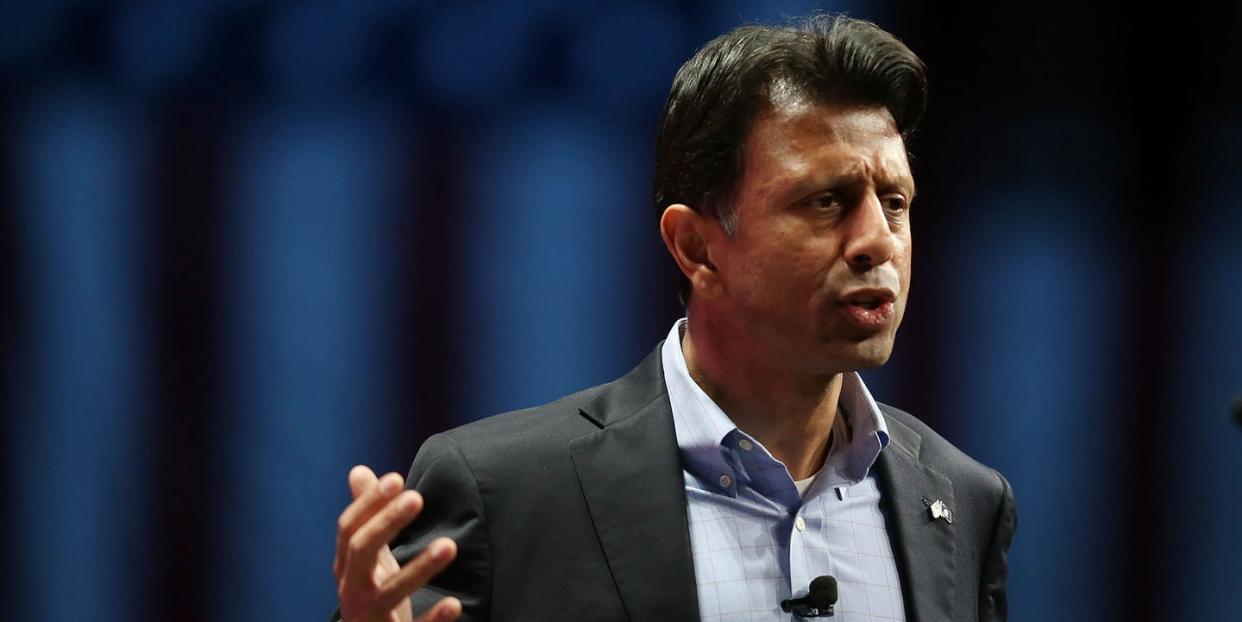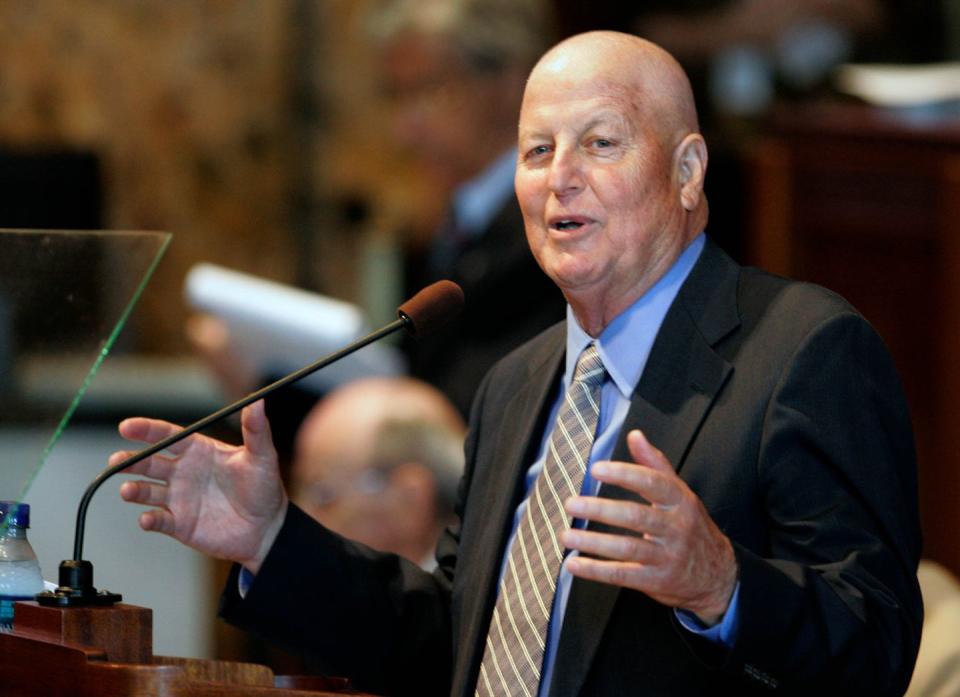Bobby Jindal's Poisonous Political Legacy Lives On in Louisiana

(Permanent Musical Accompaniment To This Post)
Being our semi-regular weekly survey of what's goin' down in the several states where, as we know, the real work of governmentin' gets done and where it's sure going to be wet down on Main Street.
We begin in Louisiana. Hey, remember Bobby Jindal? The rising star of the Republican Party? Onetime presidential timber? 30 Rock cosplayer? Well, his political career is as dead as John Tyler but, like Tyler, who has living grandchildren, Jindal has a legacy that lives on in state government. For example, thanks to his tinkering with the state's ethics laws, a slam-dunk case has dragged on for nine years. From the Advocate and ProPublica:
In 2010, the board accused former state Sen. Robert Marionneaux Jr. of failing to disclose to the board that he was being paid to represent a company in a lawsuit against Louisiana State University. The lack of transparency was only part of the problem. Marionneaux offered to get the Legislature to steer public money toward a settlement, according to charges the Ethics Board later filed against him. The money would also help pay off his contingency fee, which an LSU lawyer pegged at more than $1 million...The case is pending, and Marionneaux hasn’t been punished. The Ethics Board is set to discuss the matter again in executive session on Thursday.
Former Ethics Board Chairman Frank Simoneaux, an ex-legislator who served on the board for four years until 2012, said he was shocked to learn from a reporter that Marionneaux’s case is still unresolved. “I would classify it, and the board did also classify it, as the most egregious case we had seen,” he said. Since its filing, the case has pingponged among administrative, district and appeals courts, and the files have mushroomed to more than 1,000 pages. Today, the scandal is a distant memory, and Marionneaux has been out of office so long that his successor is nearing the end of his second four-year term.
OK, Louisiana and all that. But there's more than that, too.
However, the data that does exist shows that the number of matters referred to the Ethics Board for investigation spiked in the years following the 2008 reforms, possibly as those required to fill out new forms adjusted to the rules. The number of ethics investigations, meanwhile, has held fairly steady, at between 100 and 200 per year. (This figure excludes campaign finance investigations.) But in recent years, the number of charges filed by the board has fallen precipitously. There were 140 charges filed in 2013, but just 20 last year. That’s a drop of 86%. Moreover, most of the 20 cases were against local officials. Some were flagrant conflicts of interest, like a school clerk who transferred $14,806 in school funds to her personal account. But the board also filed charges for such low-level offenses as substitute bus drivers not completing ethics training.
Basically, it seems that Jindal's reforms resulted in a big-fish-little-fish standard of enforcement that's hamstrung cases like the one involving Marionneaux.
Take the case of Charlie DeWitt, speaker of the Louisiana House of Representatives from 2000 to 2004. DeWitt proposed unsuccessful legislation in 2003 that would have helped the New Orleans Fair Grounds derive more money from a video poker formula. The Fair Grounds’ owners had previously given him a share in two race horses, named Voodoo Princess and Noinbetweeners, and DeWitt had a long history of pushing legislation that helped the racetrack, including bills to allow the Fair Grounds to add slot machines. Less than a year after he came under scrutiny, DeWitt entered into a settlement with the Ethics Board. The deal cited him for accepting improper gifts, but it cleared him of improperly favoring the Fair Grounds. He agreed to pay a $5,000 penalty. He now says he took the deal because it was expedient. “To tell you the truth, the fine is cheaper than hiring attorneys,” DeWitt said in a recent interview.
Even so, DeWitt said he believes the ethics system in Louisiana is now worse than it’s ever been. All but one Ethics Board member signed a letter on March 3, 2008, that implored Jindal to veto a key piece of the “gold standard” legislation that curbed its powers, saying the board was “an apolitical body whose authority, in our opinion, became a political target.”
When your ethics system is being ripped in print by a semi-corrupt former speaker of the Louisiana House, I'd say there are bugs in the system.

We move on up to Tennessee, where everything is a mess, and where there's even more mischief yet to come. The legislature has decided to take the administration* up on one of its terrible ideas-namely, granting states waivers to block-grant Medicaid. Tennessee has leaped at this opportunity to immiserate its poorest citizens. From the Tennessean:
Currently, the federal government funnels about $7.6 billion into the state's Medicaid program, commonly known as TennCare. This funding isn't capped - so TennCare can grow as more Tennesseans qualify - but block grant funding would inherently be capped, potentially limiting the size of TennCare in the future. Lee said he plans to sign the block grant bill but vowed not to accept any grant that reduces funding for the state.
Grains of salt?
Despite the governor’s assurances, critics argue the block grant legislation opens the door for the erosion of the state’s health care safety net. About 1.4 million Tennesseans, most of whom are in low-income families or expectant mothers, get their health coverage through TennCare. Gordon Bonnyman, an attorney with the Tennessee Justice Center, an advocacy group that opposes block grants, said lawmakers were risking TennCare funding out of a vague desire to gain more spending flexibility, but have never explained how exactly the current system is limiting. “Right now, flexibility is just a buzzword,” Bonnyman said. “But nothing has been said about what they would do with that flexibility or why they think the flexibility we have now is not sufficient.”
This has been a dream of conservative politicians for years. The idea that a Republican governor chooses to enact it for the sake of "flexibility" is laughable. He won't be the last, either. Meanwhile, the raging dumpster fire continues to consume the Tennessee legislature. The Top is Rockier than usual, I guess.

We move along to Colorado, where a mayoral candidate is getting a fast lesson in not being a dipwad on social media. From 9News Denver:
Giellis apologized Wednesday for what she called a “momentary lapse” when she was unable to identify what the initialism NAACP stands for in an interview on the Brother Jeff Fard show. The NAACP, or the National Association for the Advancement of Colored People, is America’s best-known civil rights organization. “This campaign has expanded my knowledge of other cultures, their wants, struggles, and successes,” Giellis said in a written statement explaining her NAACP gaffe.
Ma'am, all due respect, but you're not exploring the interior of an undiscovered continent here. You're running for mayor of an American city in 2019. Maybe you should just chill for a bit. Uh-oh.
Within hours, Giellis announced a tacos and lowriders fundraiser at a Mexican restaurant in Denver. A tweet announcing the tacos and lowriders campaign event was later deleted from Twitter Wednesday night. Twitter users noted that Giellis’ personal Twitter account, under her maiden name Jamie Licko, contained a 2009 tweet in which the urban planner questioned the prevalence of Chinatown neighborhoods in cities across America. “Here’s a question: Why do so many cities feel it necessary to have a ‘Chinatown’?” Giellis tweeted on May 13, 2009. The Chinatown tweet was deleted late Wednesday night and Giellis’ entire personal Twitter account was deactivated minutes later.
A three-fer! I think candidate Giellis is running out of constituencies to insult.

And we conclude, as is our custom, in the great state of Oklahoma, where Blog Official Wagon Wheeler Friedman of the Plains brings us the saga of the governor who forgot that, in our modern times, the microphone is always on. From ABC8 in Tulsa:
The conversation included at least one lawmaker who was referring to an investigation into sexual harassment allegations against two lawmakers. FOX 25 caught the exchange by Republican State Rep. Scott Fetgatter: Unknown: “So you molested this girl after (UNKNOWN) did?” Fetgatter: “No, I was at the table, so I allowed it.” Unknown: “You allowed it to happen?
Dig we must.
FOX 25 asked Fetgatter Monday what "table" he was referring to during his conversation with another person, when he said, "No, I was at the table, so I allowed it.” Reporter: "You were talking about a table. Can you explain what that meant in that statement?" Fetgatter: "There's been some accusations that are under investigation so you guys can check with you know those..." Reporter: "So, is it part of that sexual harassment investigation that you were referring to?" Fetgatter: "That's what it was. I got to get up to the Speaker's office." FOX 25 also asked with whom Fetgatter was having that conversation. Reporter: "Do you know what representative that was?" Fetgatter: "I don't want to put them in a situation." Reporter: "You were having an open conversation..." Scott: "Thank you."
There has to be a word for the technique of double-talking doublespeak. You can get lost in that interview for weeks.
This is your democracy, America. Cherish it.
Respond to this post on the Esquire Politics Facebook page here.
('You Might Also Like',)

